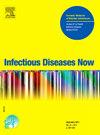口服抗生素作为碳青霉烯耐药肠杆菌科去菌落策略的有效性和安全性:随机和非随机研究的系统综述
IF 2.2
4区 医学
Q2 INFECTIOUS DISEASES
引用次数: 0
摘要
碳青霉烯耐药肠杆菌科(CRE)感染与住院患者死亡率增加和医疗费用增加有关,因此探索肠道非定殖策略的有效性是合理的。目的评价口服和/或静脉注射抗生素治疗成人CRE的有效性和安全性。方法:我们进行了一项随机临床试验和非随机研究的系统综述,比较口服和/或静脉注射抗生素治疗与不治疗或安慰剂治疗在成年CRE患者中的作用。评估的结果包括根除、感染率、死亡率、住院时间和不良事件。在Embase、MEDLINE (PubMed)和Cochrane图书馆进行检索。使用ROB1或ROBINS-I工具进行质量评估。在Review Manager中使用随机效应模型进行meta分析,并使用GRADE方法评估证据的确定性。结果纳入7项研究,728名受试者。去菌落治疗与肠道根除显著相关(OR: 2.66;95% ci: 1.55-4.55;I2: 0%)。有降低感染率的趋势(OR: 0.66;95% ci: 0.26-1.65;I2: 4%)。死亡率和不良事件的数据有限,不足以得出组间差异的结论。证据的确定性从中等到极低不等。结论本研究提示去菌落治疗可有效根除CRE肠道携带状态,但目前的证据不足以确定其对感染率、死亡率或不良事件的影响。需要更大规模、高质量的随机临床试验来获得支持其临床应用的有力证据。本文章由计算机程序翻译,如有差异,请以英文原文为准。
Effectiveness and safety of oral antibiotics as a decolonization strategy for carbapenem-resistant Enterobacteriaceae: A systematic review of randomized and non-randomized studies
Introduction
Carbapenem-resistant Enterobacteriaceae (CRE) infections are associated with increased mortality and higher healthcare costs in hospitalized patients, making it reasonable to explore the effectiveness of strategies for decolonization of intestinal carriage.
Objective
To evaluate the effectiveness and safety of oral and/or intravenous antibiotics in adults colonized by CRE.
Methods
We conducted a systematic review of randomized clinical trials and nonrandomized studies comparing oral and/or intravenous antibiotic therapy versus no treatment or placebo in adults colonized by CRE. Outcomes assessed included eradication, infection rate, mortality, length of hospital stay, and adverse events. Searches were performed in the Embase, MEDLINE (PubMed), and Cochrane Library. Quality assessment was conducted using the ROB1 or ROBINS-I tool. Meta-analysis was performed using a random effects model in Review Manager, and the certainty of evidence was evaluated using the GRADE methodology.
Results
Seven studies comprising 728 participants were included. Decolonization therapy was significantly associated with intestinal carriage eradication (OR: 2.66; 95% CI: 1.55–4.55; I2: 0%). There was a trend toward a reduced infection rate (OR: 0.66; 95% CI: 0.26–1.65; I2: 4%). Data on mortality and adverse events were limited and insufficient to draw conclusions about differences between groups. The certainty of evidence ranged from moderate to very low.
Conclusion
This study suggests that decolonization therapy may be effective in eradicating CRE intestinal carriage state, but current evidence is insufficient to determine its impact on infection rates, mortality, or adverse events. Larger, high-quality randomized clinical trials are necessary to generate robust evidence supporting its clinical use.
求助全文
通过发布文献求助,成功后即可免费获取论文全文。
去求助
来源期刊

Infectious diseases now
Medicine-Infectious Diseases
CiteScore
7.10
自引率
2.90%
发文量
116
审稿时长
40 days
 求助内容:
求助内容: 应助结果提醒方式:
应助结果提醒方式:


